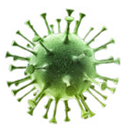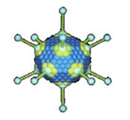

Virus transduction is a common method used to introduce new genetic material into cells. Since the first use of a viral vector on mammalian cells in the 1970’s, several different types of viral transduction systems have been developed1. The most common viral vectors used in biomedical research are lentivirus, adenovirus, adeno-associated virus (AAV) and retroviruses. Although each vector type has distinct advantages and disadvantages, sorting through the assorted details of each one can be daunting. We have put together a simple guide that should help you choose the best virus vector type to use for your experiments.
Many different factors affect the ideal vector type for each experiment. Some of the key things to consider include: What is the target cell type? Are they dividing? Do you want transient transduction or stable integration into the host genome? Will an immune response to the virus affect your experiment? What transduction efficiency is needed?
LentivirusThis is the most common viral system for gene delivery. Lentivirus is a highly efficient vehicle for introducing genes permanently into mammalian cells. This system has broad tropism (i.e. can infect a wide range of cell types) for both dividing and non-cycling cells, with relatively low cellular immune response. Live lentivirus can be produced at high titer (>108 TU/ml), and transduction efficiency for cultured cells can approach 100% under optimal conditions. |
 |
 |
RetrovirusSimilar to lentivirus are retrovirus such as MMLV (Moloney Murine Leukemia Virus). These viruses also have broad tropism and stably integrate into the host cell genome, allowing long-term, stable gene expression. However, MMLV does not efficiently infect non-dividing cells, and can produce a more significant cellular immune response than lentivirus. Additionally, the viral titer of MMLV and similar retrovirus is usually only about one tenth that of lentivirus. |
These viral vectors are non-integrating, remaining in an episomal state within infected target cells, with no disruption of the host genome. Expression of transduced genes is usually transient, particularly in rapidly dividing cells which will lose adenovirus over time. Many cell types (both diving and non-dividing) can be transduced with adenovirus, but certain cell types lack the appropriate cell surface receptor, and cannot be efficiently transduced. Cellular and in vivo immune responses due to adenoviral infection can be significant, and may interfere with certain experiments. Adenovirus can be produced at very high titer (>109 TU/ml) which allows for very efficient transduction of susceptible target cells.
AAV is another non-integrating, episomal virus usually producing transient gene expression. Unlike adenovirus, AAV has very low immunogenicity and is almost entirely nonpathogenic in vivo. A major practical advantage is that AAV can in most cases be handled in biosafety level 1 (BSL1) facilities. This viral vector has broad tropism, toward both dividing and non-dividing cells, and the relatively high titer of most AAV preparations makes this an efficient gene delivery system.
Cyagen offers many services to help with your viral vector experiments. We offer virus packaging services as well as complete design and construction of custom viral vectors through VectorBuilder.com .
| Lentivirus | Adenovirus | AAV | Retrovirus | |
| Tropism | Broad | Ineffective on some cell types | Broad | Broad |
| Can infect non-dividing cells? | Yes | Yes | Yes | No |
| Stable integration | Stably integrate | Transient, episomal | Transient, episomal | Stably integrate |
| Maximal titer | High | Very High | High | Moderate |
| Immune response | Low | High | Very low | Moderate |
영업일 기준 1-2일 내에 답변해 드리겠습니다.